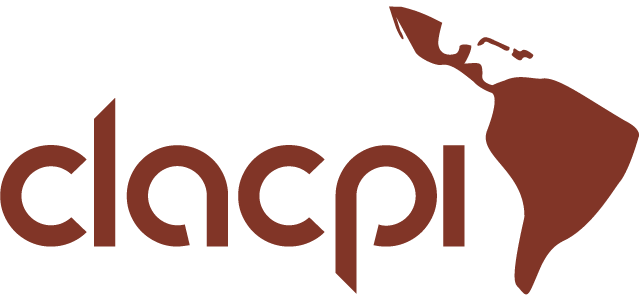13th International Film and Comunication Festival of Indigenous Peoples / 13° Festival Internacional de Cine y Comunicación de los Pueblos Indígenas / Originarios
From March 22 to 25, 2017, the Latin American Coordinator of Indigenous Peoples’ Film and Communication (CLACPI) carried out various activities in Guatemala, as part of the launch of the 13th International Film and Video Festival of Indigenous Peoples, FICMayab, this Festival, held every 2 years in a different country, is the most important of its kind for the Indigenous Peoples of Abya Yala (Latin America). At its last assembly, CLACPI members decided that the 13th Indigenous Peoples’ Film and Video Festival-now called FICMayab- will be held in Mesoamerica, with headquarters in Guatemala.
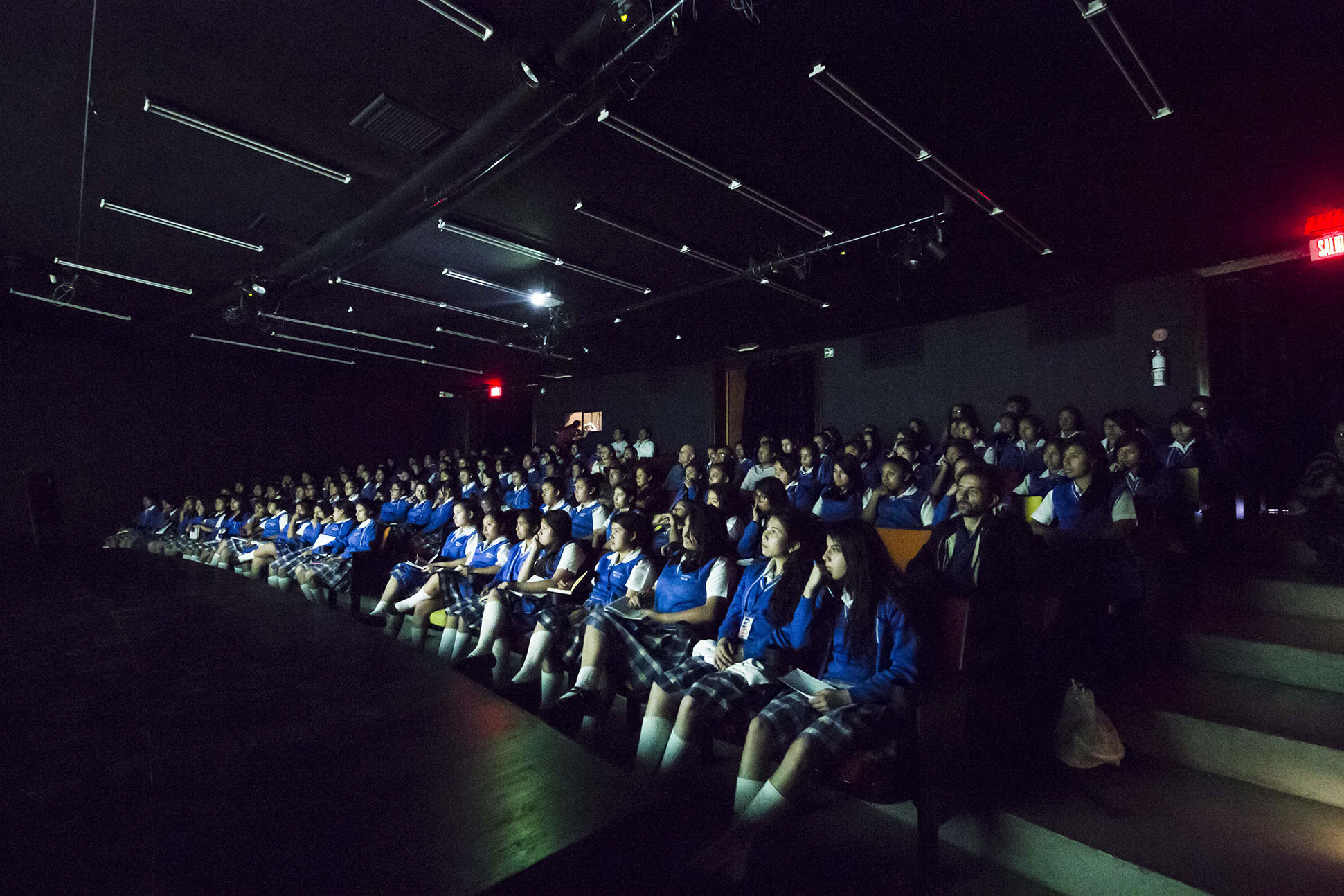
The FICMayab 2017-18 will be a diverse space of Indigenous-themed film exhibition, in different genres (documentary, fiction, animation, experimental, etc.), but mainly a space of participation and learning about cultural identity, the struggles for the defense of Mother Earth and the challenges facing the communication of Native Peoples. In this launch of the 13th edition of the International Film and Video Festival of Indigenous Peoples, CLACPI paid tribute to the Lenca leader and human rights defender, Berta Cáceres, who was murdered on March 2, 2016 for her fight in defense of the Gualcarque River, threatened by the construction of a hydroelectric dam. In addition, this festival joins the voices of indignation and rage over the massacre committed at Hogar Seguro (Safe Home), the state protection center for children and adolescent victims of violence, abandonment and child abuse, on March 8, 2017 in the city of Guatemala, which claimed the lives of 41 girls and women.
Now is the time to join the voices that call for Justice and demand that the aggression against women, Indigenous Peoples and human rights defenders be stopped throughout the region. Inspired by the light of Berta that will forever illuminate our struggles and a little over a year of its planting, we join the voice of the Civic Council of Popular and Indigenous Organizations of Honduras (COPINH) that has been shared around the world: Berta did not die … she multiplied!

Brief summary of the activities of the launch of FICMayab
To reflect a sampling of what the FICMayab 2018 will bring, over the course of 4 days, we carried out a range of activities: youth screenings in a Mayan school in a rural area, cine-forums with students from impoverished neighborhoods of the capital, and screenings and discussions with young student teachers; a public screening for the general public, with a press conference and media campaign; music and theater activities, Mayan ceremonial activities, internal work meetings and a closing activity in a resistance community. We offer in some detail below:
March 1 – 22, 2017
Screening at Xenacoj community school
With the arrival in Guatemala of a CLACPI international delegation conformed by filmmakers and guest communicators of Mesoamerica, an opening activity was carried out in the school of the village El Esfuerzo, in Santo Domingo Xenacoj, Department of Sacatepéquez.
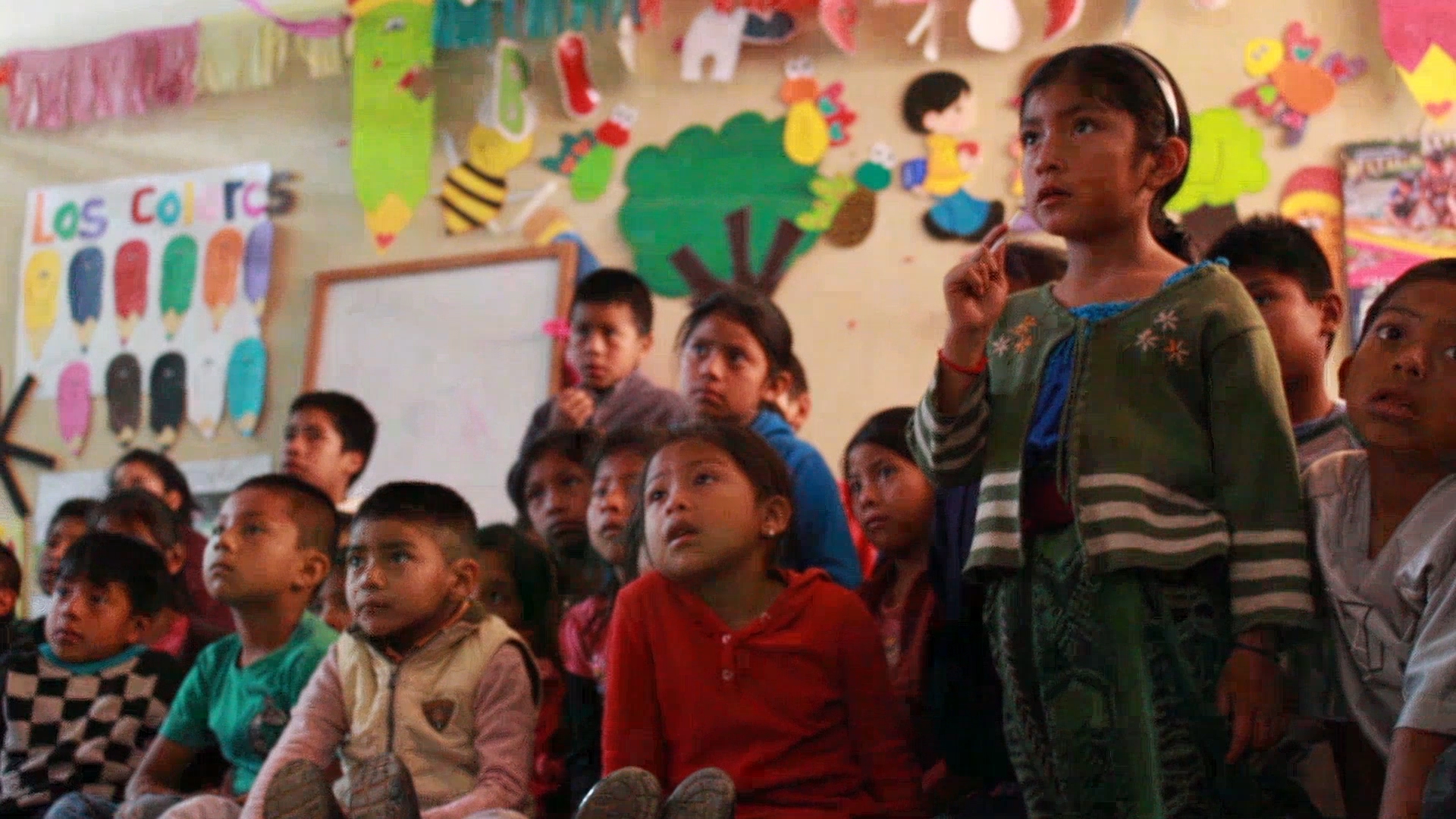
In this rural school where Mayan Kaqchikel students predominate, a selection of short films and animations was presented to a very motivated audience, featuring the animation Doña Ubenza and the short film The Road is Long by Maya Kaqchikel director Edgar Sajcabun. Edgar accompanied the activity, joined by the 5-year old protagonist of the short, Säqitz’unun Chalí Tuyuc, who along with his mother and theater actress Marta Tuyuc, attempted to respond to the curiosity and concerns of more than 140 students that ranged from nursery school to sixth grade, that attended the 2 “video-forums.” The crowning moment came with the spontaneity of a 5th grader who, upon hearing that Säqitz’unun is not going to school at the moment because no school accepts him because of his long hair, he exclaimed: “Well, bring him to this school, here we’ll accept him”.
The theme of the short film as well as the presence of its young protagonist motivated multiple reactions in the children, who were emphatic in expressing the need for non-discrimination of Indigenous peoples and respect for their rights as children. Similarly, the teachers and the director of the school expressed the need for intercultural bilingual education, reinforcing efforts to work in their native Maya Kaqchikel language.
March 2 – 23, 2017
Las Galeras School Screening
The second day of FICMayab began in El Amparo, where 130 fourth, fifth and sixth grade students from the Official Mixed Urban School 441 in Las Galeras (Colonia El Amparo I, Zone 7) arrived by truck to the auditorium of the CCEG in downtown Guatemala City.
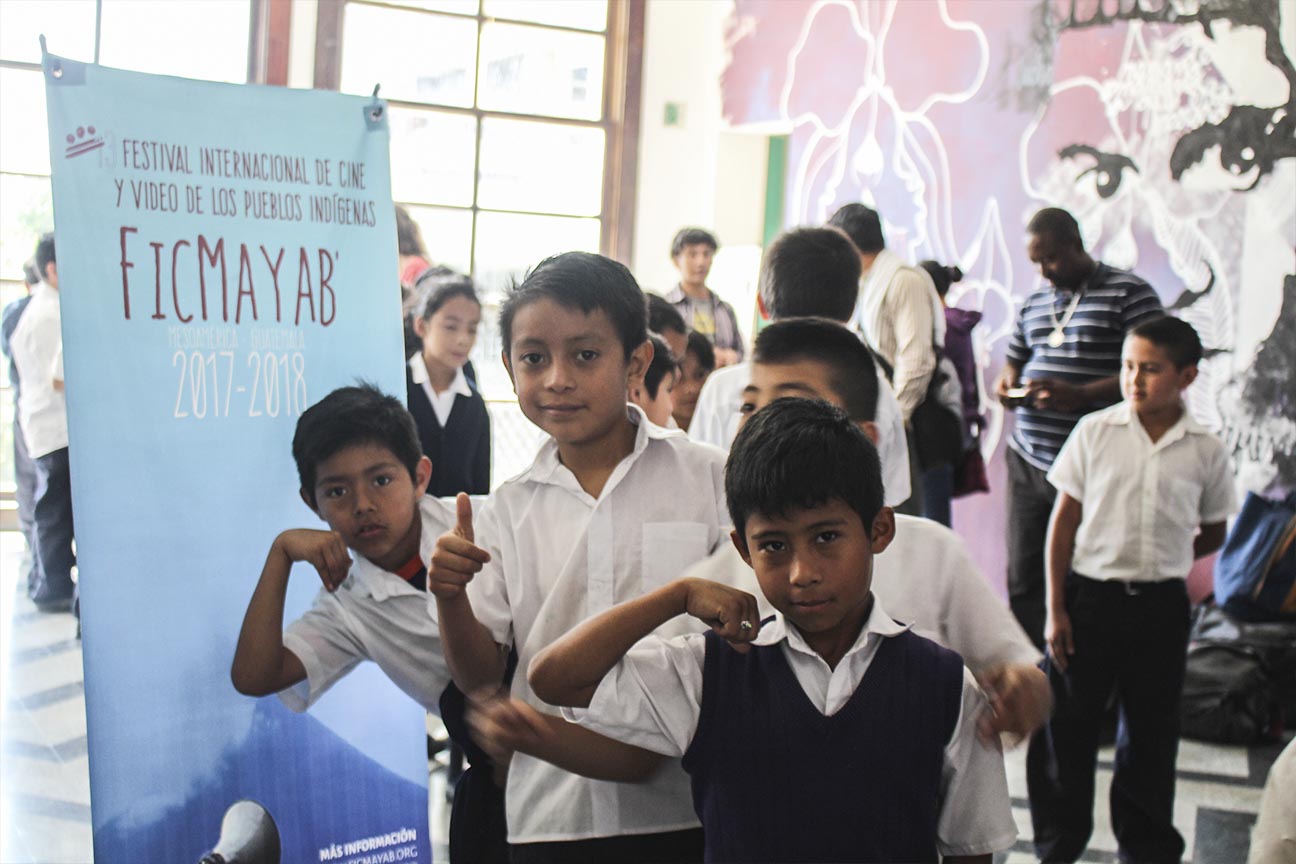
For most of the children, it was the first time they attended a movie theater, and for all it was the first time they heard and saw the achievements of Indigenous peoples. The activity began with the excitement of the novel experience of seeing the animation Doña Ubenza, The Road is Long, Yes to life, not to the dam and Children in Resistance. There were two moments for discussion: one to discuss intercultural education and another to discuss the need to preserve the environment. Both children and teachers were very excited about the activity and hope that it is not the last time they can go to the movies, or that the cinema reaches their school!

Screening at the School of History of the University of San Carlos
That same day, in the afternoon, a community screening was held at the School of History of the University of San Carlos, Guatemala, within the transdisciplinary programs and the Permanent Seminar on Critical Thinking at the Institute of Historical, Anthropological and Archaeological Research (IHAA).
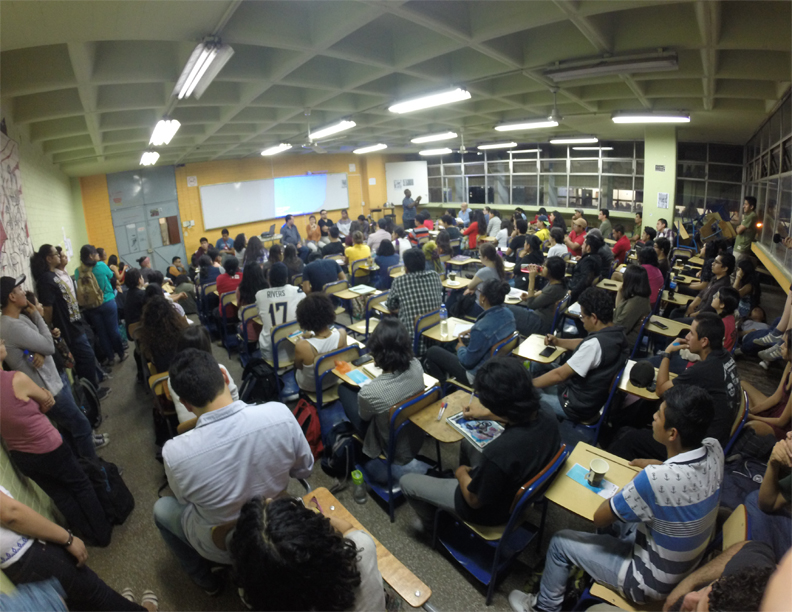
About 120 students from the school participated in the Cine-Forum on Extractivist Violence and Struggles in Latin America. The activity was coordinated by the Tz’ikin Network and the History School; Prof. Carlos Rafael Castillo Taracena, Prof. Jaime Chicas, Prof. Mauricio Chaulón Vélez and the student Andrea Morales participated on behalf of the USAC. CLACPI participants included Q’eqchi 'director, member of Red Tz’ikin (Guatemala), Marta Choc Calel, Gaspar Sánchez, of the Civic Council of Popular and Indigenous Organizations of Honduras (COPINH) and César Geovany Bernárdez, of the Fraternal Black Honduran Organization (OFRANEH).
The activity was loaded with emotions. While all of the remarks were outstanding, the powerful words of our colleague Marta Choc appealed to the need for access to free higher education for all the peoples of Guatemala, where currently the majority of the population cannot afford it; she also highlighted the role that the Tz’ikin Network is playing in this process of informal training in rural communication.
They presented the documentaries Yes to life, not to the dam by Red Tz’ikin and Berta Lives, by Katia Lara. A debate followed the screening, with the panellists from Honduras were visibly moved, some to tears. Giovany of OFRANEH expressed: “We live in a country where when we go file a complaint, we are instead targeted and criminalized, putting our lives in danger daily; to this date it has been impossible to punish the intellectual authors of the murder of comrade Berta Cáceres. We are two organizations that are fighting for the common good, for whom the sale of land is not negotiable, alongside the highest universities … And the other thing we stop being cover and be content. Here in Guatemala we witness situations and it’s not just in Honduras, in Tegucigalpa, where the students are taking up the fight. What affects the Indigenous people affects everyone, all of us will be affected.”
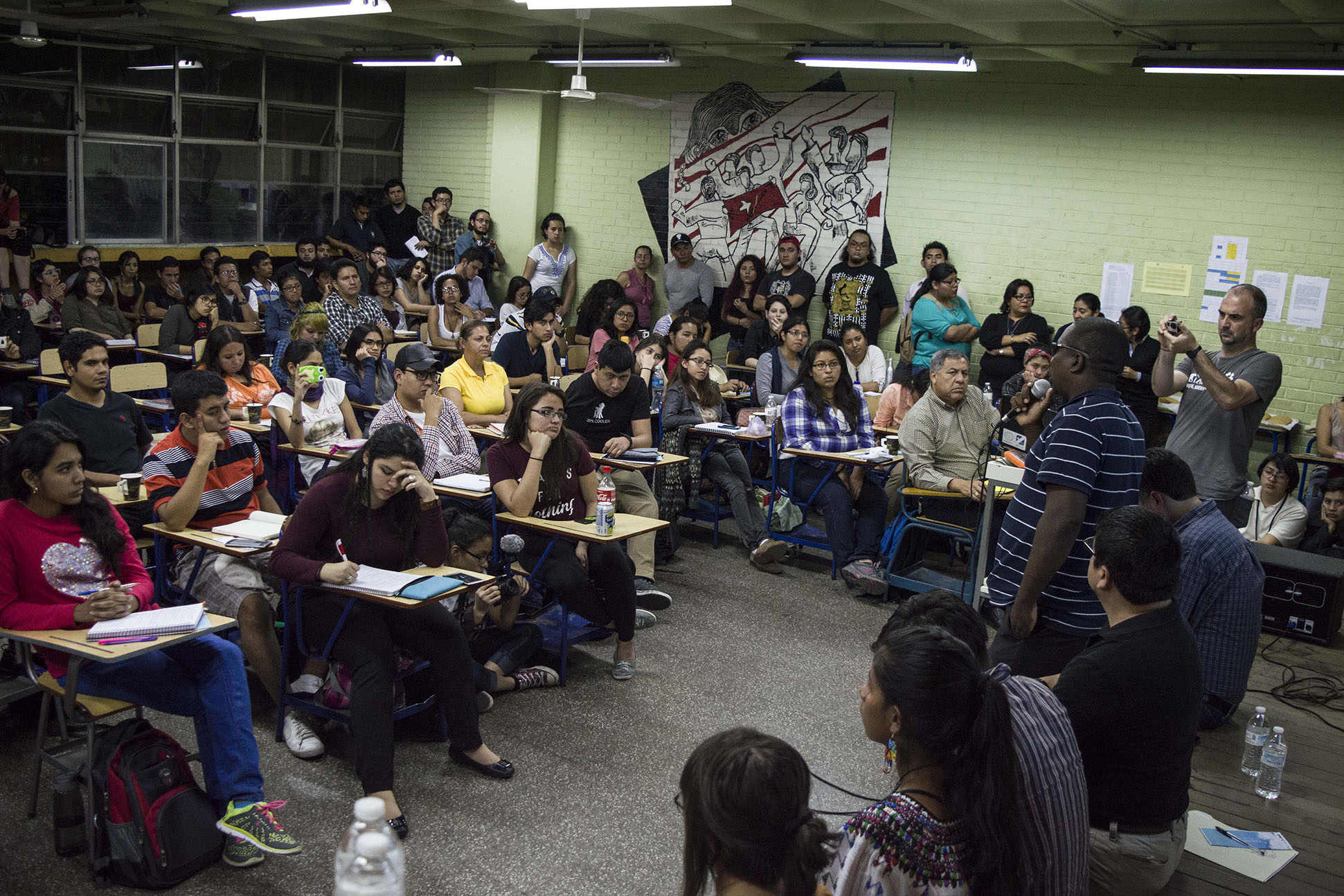
Andrea Morales, representing the History students, questioned the role played in recent years by the university, which is far removed from the social reality of our peoples: “the same people who finance academic work to dismantle resistances are the same people who provide funds for a certain type of film with a specific model of exhibition (...) We must recognize the Sancarlista tradition but we must be super critical; this is not the university we used to have, it is a university whose academic model must be rethought. In that sense, I find the community film projects beautiful because it helps block a bit this industrial logic of making films. Not in vain in this new wave of dispossession and occupation of our territories—including the body and mind—we see great investment in the ‘American’ film industry and in the poverty porn of European festivals; then comes community cinema to announce that we are going to recover a way to speak from our agency and positionality, without a mediator but also in a shared way. “
The professors of the USAC showed deference with their guests and offered excellent interventions that helped link the situation of Honduras to that of Guatemala. In closing, Prof. Chaulón stated: “We have to carry out a truly committed fieldwork, and if we have to reformulate the ways in which we are speaking and leave our comfort zones. The first step is self-criticism and the second is to stop thinking that the teacher is the enemy … or that the student is the enemy. The enemy is outside, I think this is a key moment for the School of History. “
March 3 – 24, 2017
Press conference
On the third day, a press conference officially launched the 13th International Film and Video Festival of Indigenous Peoples: FICMayab 2017-2018, with Mariano Estrada, General Coordinator of CLACPI (Mexico), Iván Sanjinés, coordinator of CEFREC (Bolivia), Marta Choc Calel, director Q’eqchi 'and member of Red Tz’ikin (Guatemala), Flor Elena Lopez, representative of ACISAM, (El Salvador).
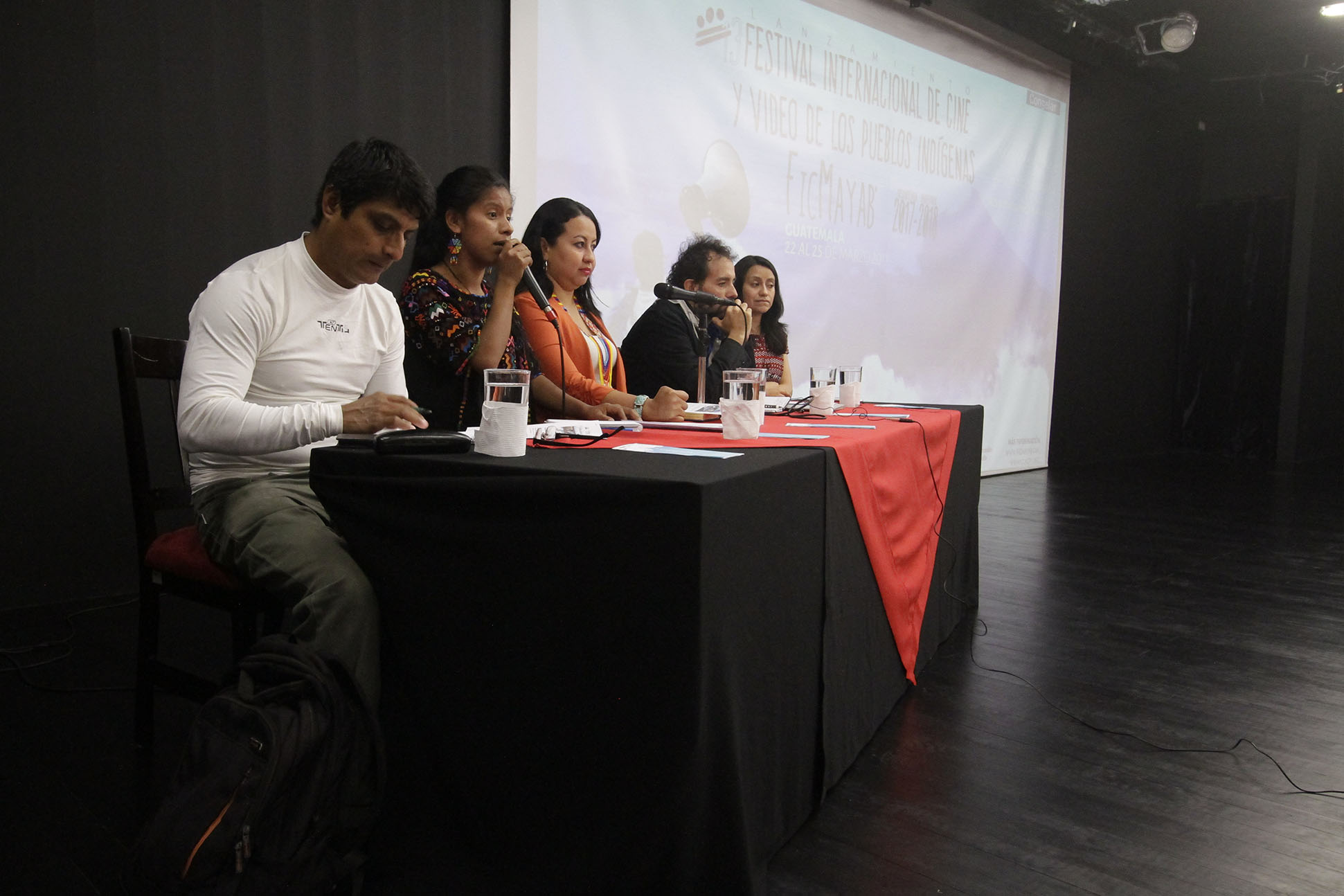
Main aspects of CLACPI’s achievements over its 30 years of activity were presented, alog with the the structure of the 13th Festival and the actions that will be carried out throughout 2017 and 2018:
- 2017: Itinerant Screenings “On the Road to FICMayab” in communities, educational centers and municipalities of southern Mexico, Guatemala, Belize, El Salvador, Honduras, Nicaragua, Costa Rica, and Panama. Complemented by Forums on Indigenous Film and Video and workshops on indigenous community audiovisual production.
- 2018: Itinerant Screenings in Guatemala during the months of March and April 2018 in communities, educational centers and universities. Finally, the Central Event of the 13th FICMayab Festival will be held in three different venues in the highland region and Alta Verapaz (October 1-18).
The press conference was featured in the national and international media, with various press agencies noting the launch: Agencia EFE, TeleSur (Venezuela), La Vanguardia (Spain), Mapuexpress (Wallmapu, Chile), Diario de Centroamérica (Guatemala), and FGER (Guatemala).
Instituto Belén Student screening
Following the press conference, a screening was held with students from the Central Normal Belén Institute, witg 4th and 5th year teachers of Intercultural Bilingual Child Education, with whom they shared part of the Official Programming of the FICMayab, including Doña Ubenza and The Road is Long.

A discussion followed, about the education we have and what it should be, highlighting the students’ criticisms of the current educational system that often represses and restricts rights and does not facilitate the integral educational process of the students. One student said: “I felt that I was there and wanted to do something to that teacher, I felt powerless to not be able to enter (to the screen) and tell him not to do it … because he is a child and you are violating his rights.”

The documentaries “Yes to life, not to the dam and Berta Lives screened and the directors of these works debated with Gaspar Sánchez of the Civic Council Of Popular and Indigenous Organizations of Honduras (COPINH) and César Geovany Bernárdez, of the Honduran Fraternal Black Organization (OFRANEH). Sánchez said: “Just in the Lenca territory there are 49 other projects that (the companies) want to implement and the pilot project is the Agua Zarca hydroelectric project. That’s why we say “Berta Vive”, and the COPINH continues … I want to tell you girls that you are the future of this country, you should not isolate yourself from the struggles taking place in the communities, because although you live in the city, remember that without water or air, you will not be able to live. Because the water that is used in the cities comes from our communities, therefore we can not leave Indigenous communities alone in this struggle and we who live in the cities also have to consider this our fight. I believe that this is the message Berta left to us all. Because Berta was a woman who came to dignify the Honduran people and the defense of the common goods of nature not only in Honduras but in the world, that’s why her name resounds and will continue to resonate in the world. Because for us Berta did not die- she multiplied and because we planted her and now we are reaping that seed and continue demanding justice.”
At the end of one of the students of the Instituto Belén, on behalf of all her colleagues took the microphone and said: “we want to thank you forsharing this information that makes us see that we have to fight for our environment, that it will help our generations and us as well; thank you for letting us know what Berta suffered and that we will continue to fight for her. “ Her comment caused the general applause of her colleagues.
Offering for Guatemalan Girls
The CLACPI delegation and guests made an offering at the ceremonial site located in Guatemala City’s Central Plaza, where the 41 girls were killed on March 8, 2017.
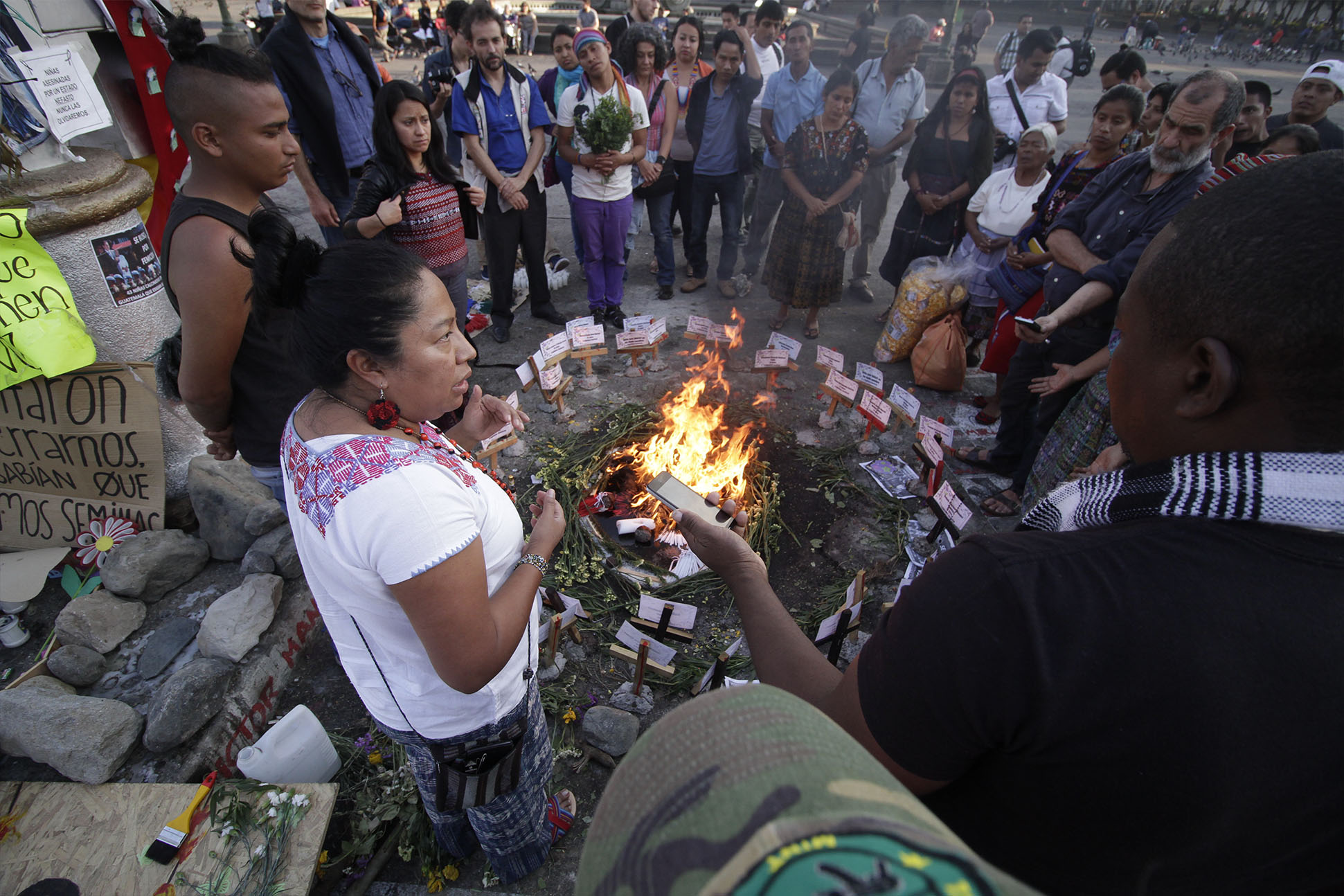
In the words of Ivan Sanjinés of CEFREC (Bolivia): “We come to present our anger, our pain and solidarity with the people of Guatemala before this terrible crime of state . We must not allow events of this nature to occur in Guatemala and any other territory of Abya Yala, we demand justice for the girls.”
Official Launch
From March 18-24, the Official Presentation of FiCMayab 2017-2018 was held at the Main Auditorium of the Cultural Center of Spain in Guatemala, with the presence of international and national CLACPI-affiliated communicators from Mexico, Bolivia, Venezuela, Honduras, El Salvador, Panama, Nicaragua and Guatemala.
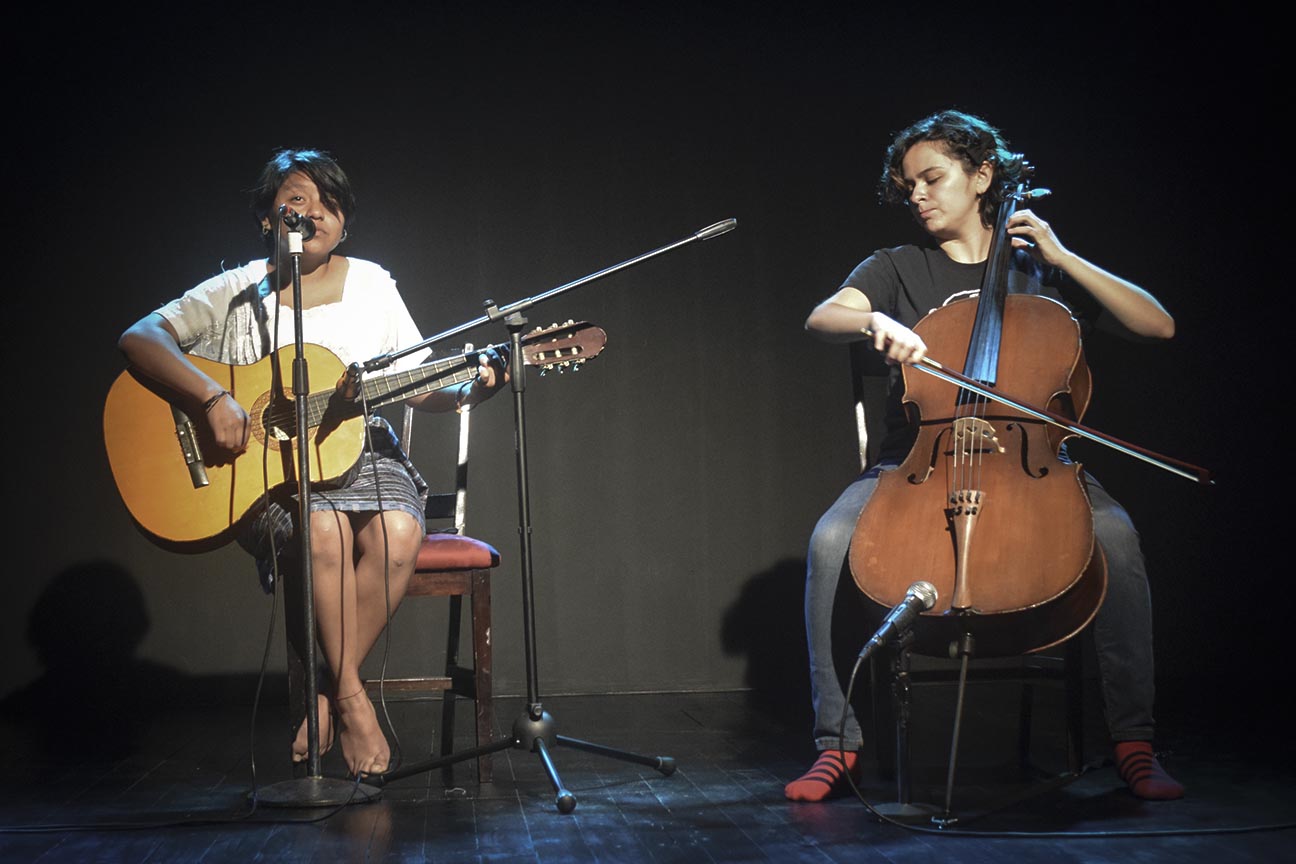
The activity opened with the music of Mayan singer-songwriter Poqomam Ketzali accompanied on cello by Libertad. CLACPI Coordinator Mariano Estrada offered a few words and resented a commemorative video of the 30 years of CLACPI, followed by a selected exhibition program to launch the festival, and dedicated to the memory of Berta Cáceres. The following works were presented:
- Doña Ubenza. Diaguita Calchaquí Nation, Argentina, Animation, 4 min, 2015, J.Manuel Costa.
- The way is long. Maya Kaqchikel Nation, Guatemala, Fiction, 7 min, 2016, Edgar Sajcabun. In Maya Kaqchikel, with subtitles in Spanish.
- The threads that weave us. Ñuu Savi Nation, Mexico, fiction, 18 min, 2014. Melissa Elizondo. In Ñuu savi with subtitles in Spanish.
- Yes to life, not to the dam. Q’eqchi ' peoples, Guatemala, documentary, 9 min, 2015, Red Tz’ikin, ACODET, PI. In Q’eqchi ' with subtitles in Spanish.
- Berta Lives. Lenca Nation, Honduras, documentary, 30 min, 2016, Katia Lara.
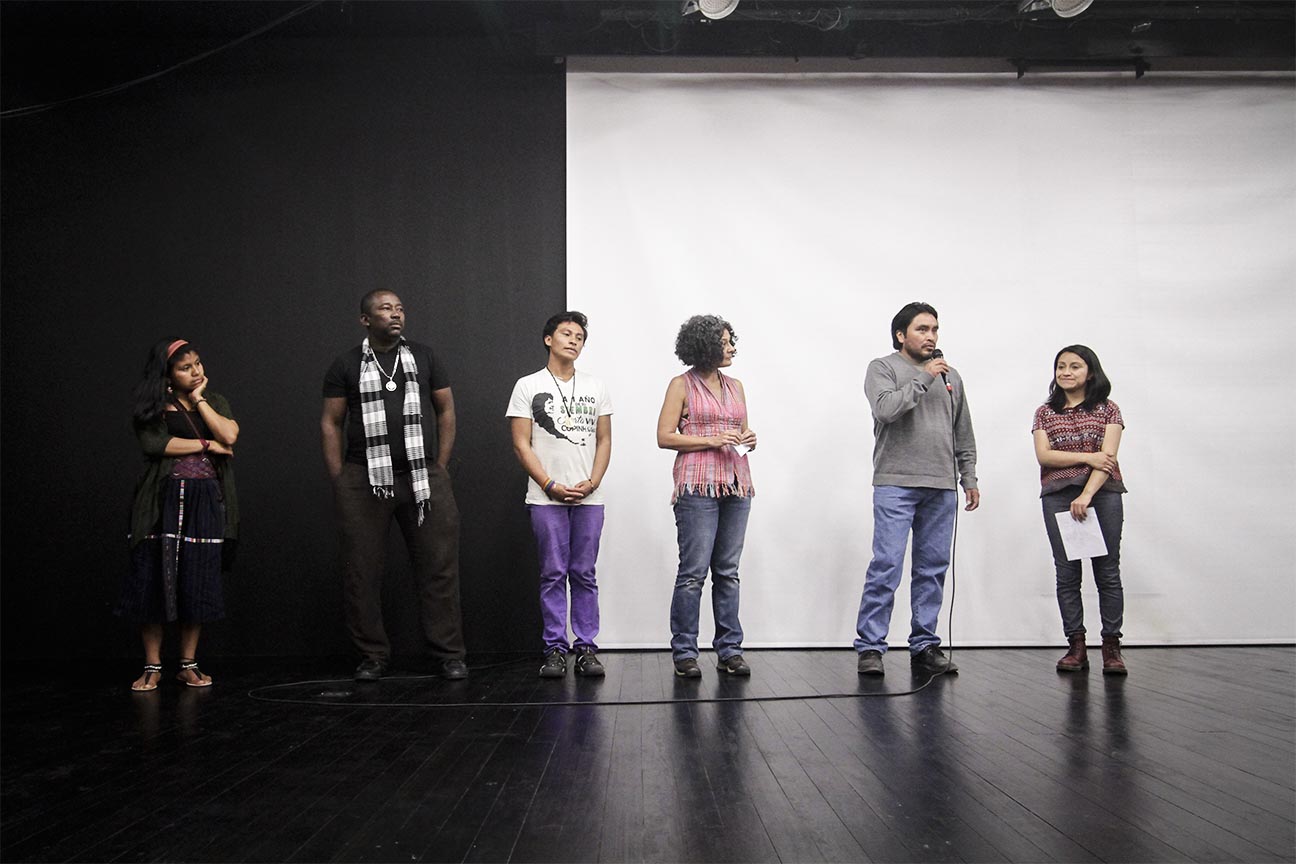
To close this presentation we enjoyed the emotional words of directors Edgar Sajcabun, Feliza Juan Mateo, Katia Lara and representatives Gaspar Sánchez (COPINH ) and César Geovany Bernárdez (OFRANEH) who stressed the need to continue fighting and promoting this type of activities from the besis of Indigenous and community communication. At the end we were able to continue to talk and taste a handcrafted jocote wine from San Juan del Obispo along with delicious tamales cooked by the mother of our beloved companion Paola, from the Cine Collective on El Amparo Street.
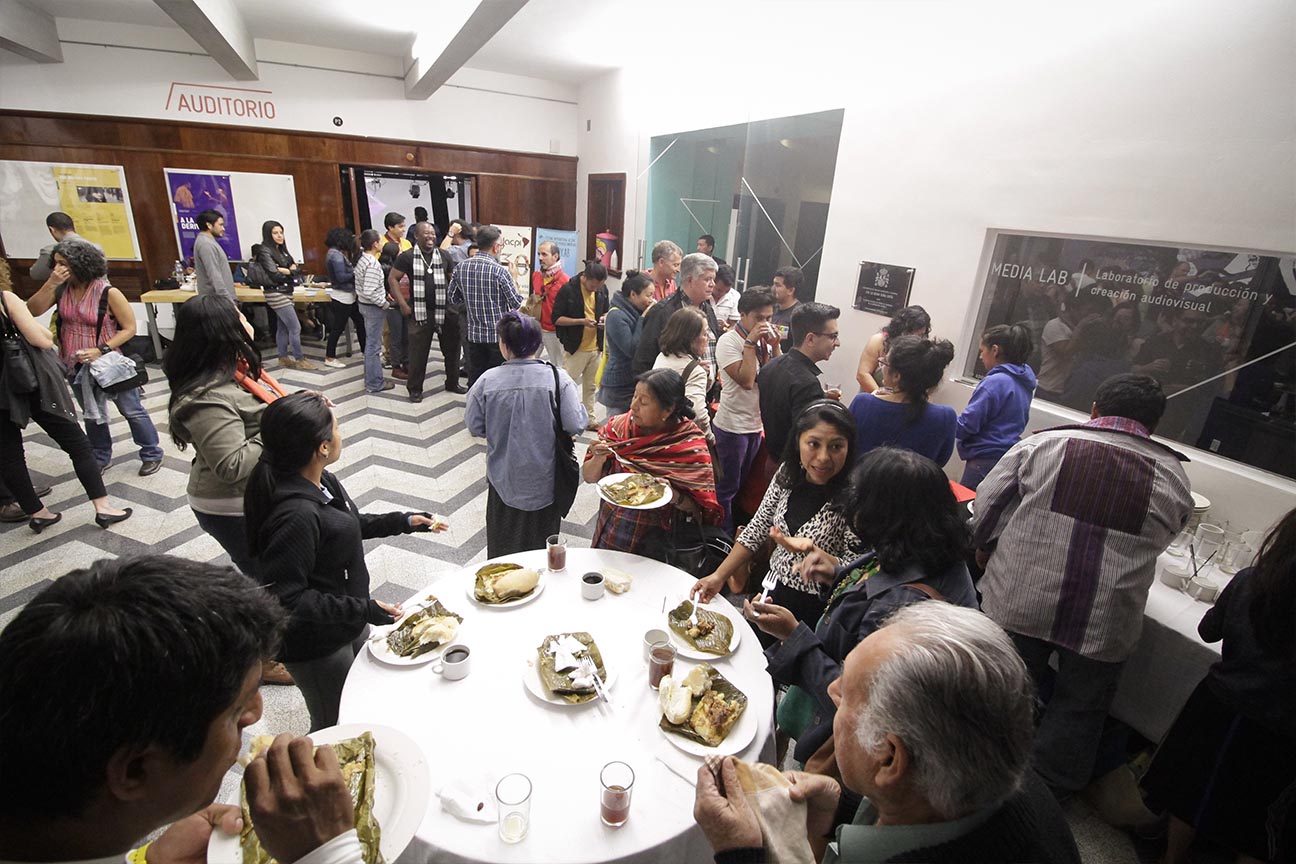
Day 4 – March 25 CLACPI Organizational Meeting
With the excitement of having already completed much of what was scheduled, we began the last day of activities, with our follow-up meeting on the preparation of FICMayab’s Traveling Screenings throughout Mesoamerica.
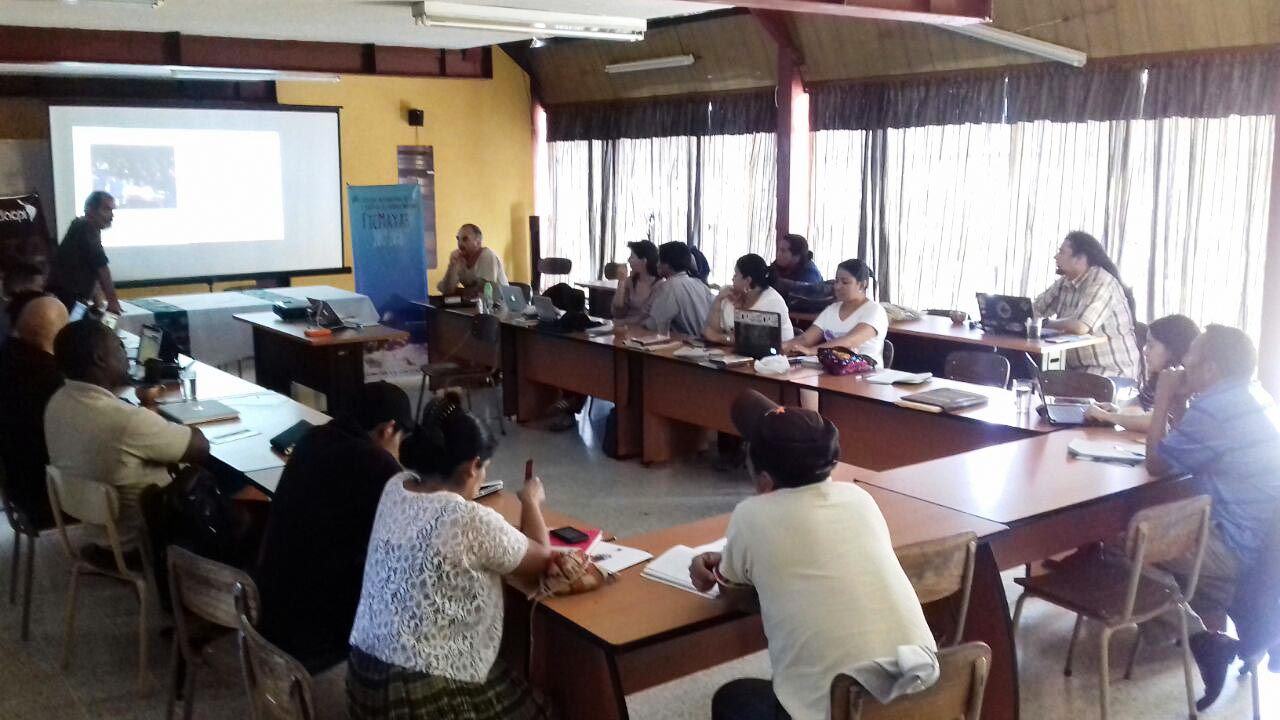
After several hours of exhibitions and work in groups, a plan was articulated for regions where over the coming months we hope to be able to develop a program of Indigenous Cinema Screenings – “Rumbo to FicMayab“ in Chiapas, Oaxaca, Guatemala, Belize, El Salvador, Honduras, Nicaragua and Panama.
La Puya Screening
The closing activity of the festival launch was at La Puya Peace Resistance camp, a settlement organized 5 years ago by neighbors of the municipalities of San José del Golfo and San Pedro Ayampuc, who resist the construction of an open-pit gold mine, intended to settle just 10 kilometers from Guatemala City.

The film exhibition in La Puya was accompanied by a Mayan ceremony of thanks for the life and organization of the peoples in defense of their commons. After the screening, we shared the experiences of the representatives of the different territories present: Chiapas, El Salvador, Honduras, Nicaragua and Panama, as well as the experience of the comrades from Ixcán in Guatemala and of the Peaceful Resistance of La Puya.
With these activities, the 2017 launch of FicMayab 2017-18 concluded, with the promise to carry out and bring images throughout Mesoamerica “for Memory, Territory and Life”.
Text: Red Tz’ikin
Photos: Daniel López, Eduardo Say, Mayra Esteban, Katia Lara, Alvaro Revenga, Iván García, David Hernández Palmar.
Translation: Thanks to Mingamedia y Amalia Córdoba
More: www.clacpi.org / www.ficmayab.org

